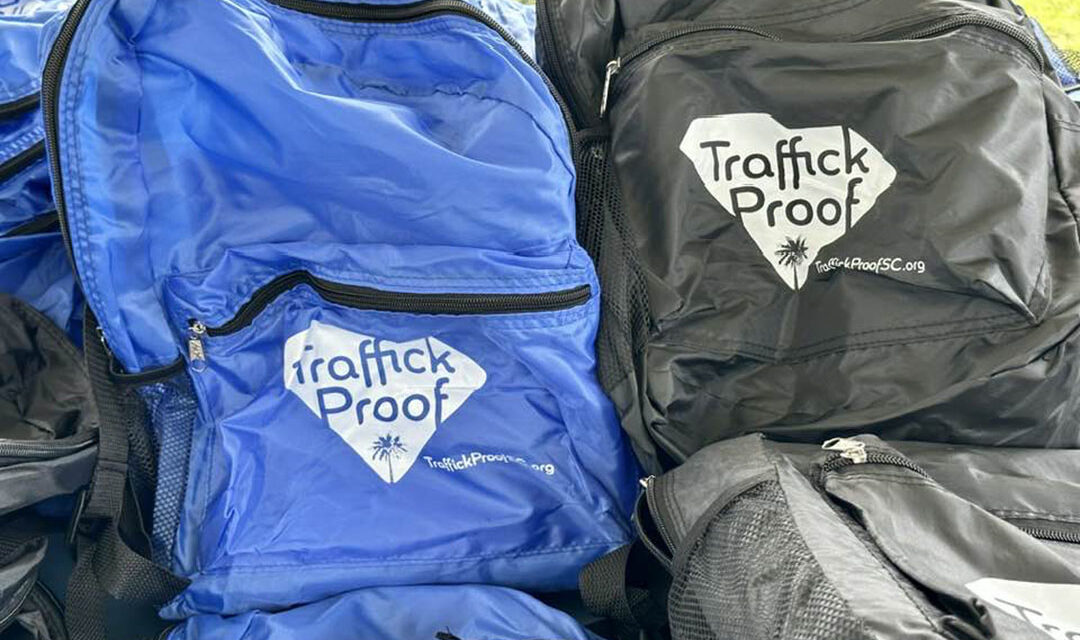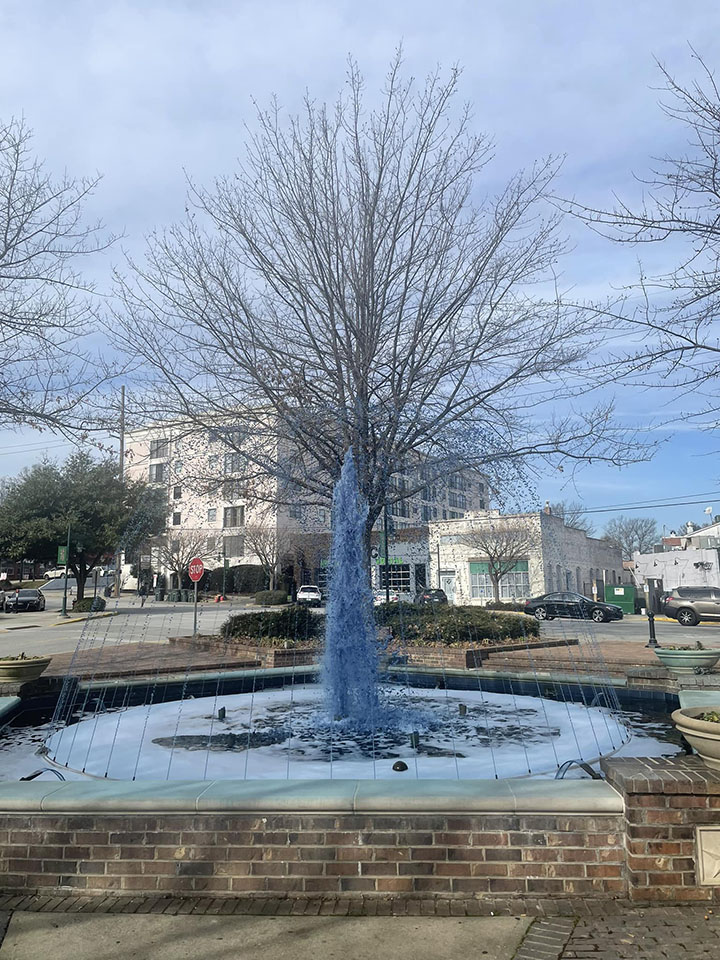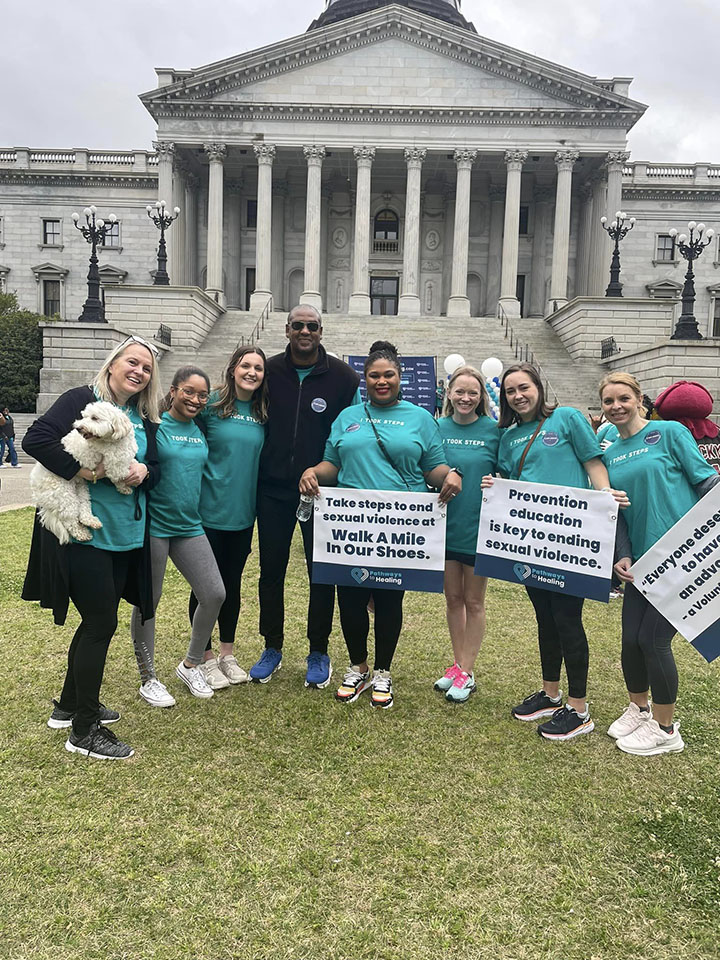TraffickProofSC backpacks (Photos courtesy of the South Carolina Human Trafficking Task Force)
The numbers are jumping dramatically.
South Carolina saw a 450% increase in labor trafficking victims in 2021.
The state also saw an increase in sex trafficking victims.
Both involved a notable number of children.
The massive jump in labor trafficking victims is partly a result of efforts to increase awareness, said Kathryn Moorehead, the director of the S.C. Human Trafficking Task Force. That included promoting the Human Trafficking National Hotline for people to call for help and to report anything they’ve experienced or seen.
“I think it’s really understanding that trafficking isn’t the white van kidnapping a kid on the corner,” Moorehead said. “It’s the person down the street who’s becoming friendly and grooming the child or the family member who is trading the child to cover rent or to get drugs.”
The South Carolina Human Trafficking Task Force monitors both sex trafficking and labor trafficking, which together are considered human trafficking.
The task force defines human trafficking as a person being made by force, fraud or coercion to carry out commercial sex acts or forced labor. With minors, money doesn’t have to be involved. Just the act of persuading a minor to take part in a sex act is illegal.
The task force, overseen by the S.C. Office of the Attorney General, released the latest human trafficking data on Jan. 9.
It happens right here in Richland County
The counties of Richland – home to the Columbia, the state capital – Greenville, Charleston, Horry and Spartanburg reported the most human trafficking cases.
In Richland, the cases often involve multiple victims, according to local media outlets:
– In June of this year, a man was arrested and charged with trafficking a 15-year-old girl and a 16-year-old girl in Columbia’s St. Andrews area.
– A Blythewood man was indicted in August 2020 on seven counts of sex trafficking that involved several victims, including a minor.
– Deputies in 2016 located three runaway girls at a motel near Broad River Road. Three suspects were charged with human trafficking.
Jennifer Mason is the anti-human trafficking coordinator of the Richland County Regional Task Force. She said a lot of people travel through Richland, because it’s where several interstates intersect.
“We have historically been at the top of that list,” Mason said.
In the 2022 report, Richland County had the third most reported human trafficking cases. In the 2021 report, it was second.
South Carolina’s State Law Enforcement Division documented 416 human trafficking victims, of whom 399 were minors, in the 2022 annual report, the latest year for which figures are available.
There was also an increase of children identified as sex trafficking victims in the report.
“Based on what we’ve seen so far, I think these numbers may be higher this year,” Moorehead said.
Mason said children are more vulnerable than adults.
“They have a harder time being able to escape just because they’re young and they don’t know how to drive,” Mason said. “And they don’t know where to go. And they just don’t have the resources that adults have.”
Traffickers function on the hierarchy of needs, such as food, water, housing and clothing, when it comes to children, Moorehead said.
“They can give them a place to sleep if they’ll do XY and Z,” Moorehead said.
They also observe the level of social interactions and relationships a child may be lacking, Moorehead said. Traffickers look to fill that void.
“Once they’ve filled that void, the young person feels like they owe the person,” Moorehead said. “They’re their person all of a sudden, they’re their social network, and they’re going to do basically whatever they’re asked to do.”
What is being done to stop it?
To remove this vulnerability surrounding minors, the Task Force partnered with South Carolina ETV and public radio.
They created TraffickProofSC, a new human trafficking prevention education curriculum for middle and high school students.
It tackles four main subjects:
- Human Trafficking Overview: What is Human Trafficking?
- Staying Safe Online
- Labor Trafficking and
- Sex Trafficking.
Students learn the warning signs of human trafficking, methods traffickers use and more.
Separately, Pathways to Healing, a nonprofit in Columbia, has set out to end sexual violence through advocacy, education and supportive services, executive director Rebecca Lorick said.
“A lot of people kind of turn a blind eye to it, and it really is an issue,” Lorick said. “It’s a huge issue in our state and in Richland County.”
Pathways to Healing works with state agencies and other nonprofits to ensure those organizations are providing comprehensive services, Lorick said.
A Pathways to Healing advocate is housed in the Richland County Sheriff’s Department’s victim services division.
And an investigator from the sheriff’s department is housed at Pathways to Healing’s office a few times a week, Lorick said.
“It has been pretty amazing to see the increase in reporting, just by having that partnership,” Lorick said.
People in sex trafficking situations can be afraid to report to law enforcement because of illegal activities traffickers may have made them participate in, Lorick said.
Lorick said investigators in the office have conversations with victims to help assure them they will not be charged for being a victim.
“We just try to spread awareness and really try to get people more comfortable talking to law enforcement – because there’s certainly a fear of reporting to law enforcement,” Lorick said. “And we’re doing the work to make sure that people feel more comfortable.”
The Hive, an organization in Columbia aiming to help women and girls overcome sexual assault, also offers services for human trafficking victims.
Ari Foster is the peer support program manager at the Hive.
“Our peer healing circles are psychoeducational wellness groups,” Foster said. “So, they’re space for survivors to come together and really just build a sense of community.”
Human trafficking comes in many different forms and fashions, Moorehead said.
“And that speaks to the complexity of the crime.”
The water in the Five Points fountain ran blue in January to help raise awareness of human trafficking. (Photo courtesy of the South Carolina Human Trafficking Task Force)
People at Pathways to Healing’s “Walk a Mile in Our Shoes” event in April. (Photo courtesy of the South Carolina Human Trafficking Task Force)




